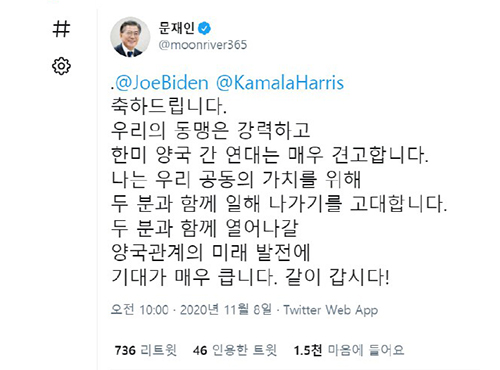I'm happy to share my recent article in Seoulz.com
Korean Global Business in the Biden Era – The Impact on South Korea

“Our alliance is strong and the bond between our two countries is rock solid. I very much look forward to working with you for our shared values. I have great expectations of advancing and opening up the future development of our bilateral relations. Katchi Kapshida (Let’s go together).”
Biden’s Eco-Friendly Policies Impact on Korean Global Business
First, and in particular, much of Biden’s U.S. economic policy will be to support eco-friendly businesses. Biden in his economic policy and for job growth plan has posed that the U.S. invest $2 trillion in clean energy and infrastructure over the next four years. The ultimate goal is to ensure the United States reaches net-zero emissions by 2050. He will push congress to invest in clean energy innovations. Among the projected investment, Biden has also said that $300 billion will be used for AI, 5G, network platforms, and electric vehicle industries.
This will have a very positive ripple effect on Korea’s IT, ICT, and network companies. Not to mention, Korea’s eco-friendly businesses such as fuel cells, secondary batteries, and urban mobility will also be boosted thanks to Biden’s proposed clean energy policies. South Korea is already a global leader when it comes to fuel cell technology for utility-scale power generation. Therefore there will be a high potential for cooperation between the two countries to work together to promote energy innovation and to provide a cleaner solution.
The K-New Deal
 This all aligns very well with President Moon and the Korean New Deal, or the K-New Deal. The K-New Deal is $138 million of investment in the digital and green sectors. Some of the programs will be in big data, AI, green energy, and eco-friendly mobility. The K- New Deal would see economic drivers and job creation in the high-tech, high-wage green industries of the future.
This all aligns very well with President Moon and the Korean New Deal, or the K-New Deal. The K-New Deal is $138 million of investment in the digital and green sectors. Some of the programs will be in big data, AI, green energy, and eco-friendly mobility. The K- New Deal would see economic drivers and job creation in the high-tech, high-wage green industries of the future.
The plan also includes building smart grids and boosting the number of Korean electric cars (EV) from the current 110,000 to 1.13 million by 2025. As well as, increasing the number of hydrogen vehicles (HCEV) from 8,000 to 200,000. In addition, the Korean government plans to create New Deal investment funds in these sectors with losses backstopped by the government. South Korea’s K-New Deal has been praised by global investors and analysts. Therefore we can see both governments (US/South Korea), policy-wise, closely cooperating in these industry sectors.
The US/South Korea Alliance
Secondly, and prior to the election, Joe Biden has repeatedly said that he wants to “work with allies.”
For South Korea, diplomatic experts feel a Biden administration will mean returning to traditional alliance management.
Concerning China, I feel Biden is less likely to force South Korea to pick a side in the ongoing competition with China, although commerce issues and trade deficits will continue to be the defining features of the US-China relationship.
Like Trump, Biden will want to protect American manufacturing and bringing back the jobs outsourced to lower-wage economies. This will take priority over championing free trade and international commerce. In fact, Biden has pledged not to enter into any new FTA
“until we have invested in Americans and equipped them to succeed in the global economy.”
Again, this aligns well with Korean companies that have considerable investments in the U.S. and, in turn, the local jobs they create. In other words, with Biden, his domestic economic policy will receive an overwhelming share of attention.
Looking Forward
I do need to point out that Korea’s industries still need to expect to face a thorny path. In terms of overseas trade and tariff issues between the U.S. and China are expected to be troublesome regardless of the Biden win.
One caveat, too, is Biden has pledged to aggressively support carbon reduction. He will impose carbon adjustment fees or quotas on carbon-intensive goods from countries that are failing to meet their climate and environmental obligations. For Korean global business, this could target its petrochemical, battery, and steel industries.
In a follow-up commentary, I will provide some additional thoughts on how Korean facing business. For example, western companies in Korea and Korean companies with operations overseas may look to position themselves. I will also tackle how future North Korea-South Korea– U.S. relations may unfold.
I look forward to comments.
No comments:
Post a Comment